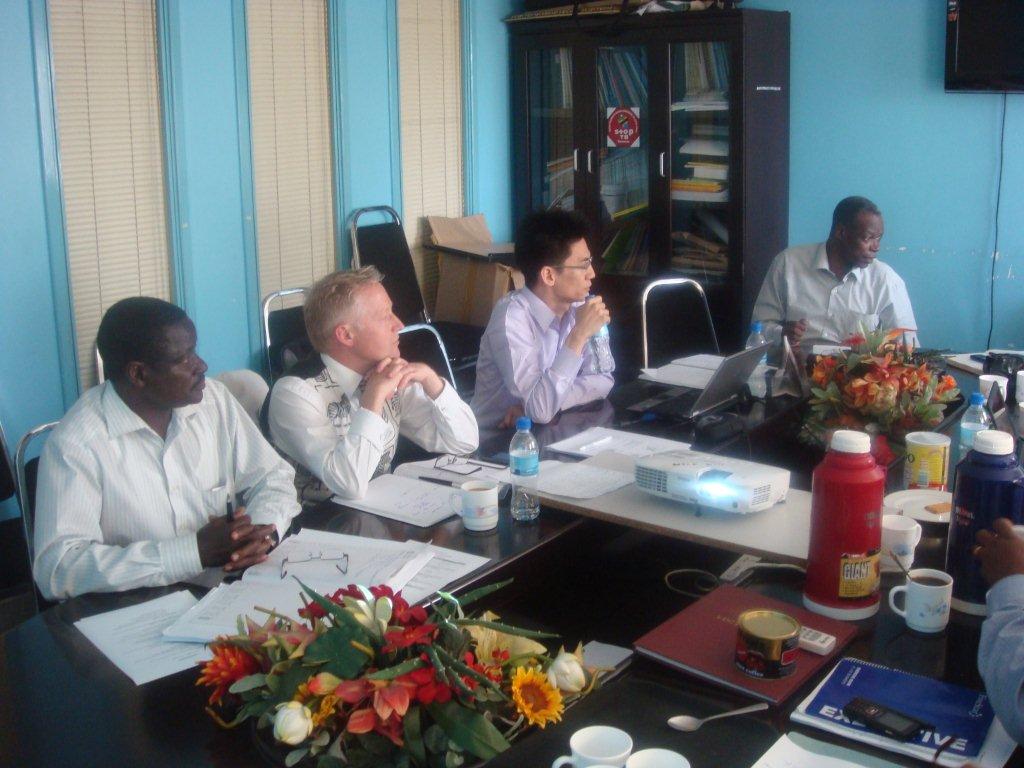

 |
||
|
::: NTU Cross-National Tuberculosis Prevention Research Published in The Lancet Global Health |
||

Research Team holding a meeting at the National Tuberculosis and Leprosy Programme in Tanzania
A cross-national collaborative research led by National Taiwan University’s College of Public Health was recently published in the internationally acclaimed The Lancent Global Health on Sept. 25, 2014. Titled “Assessment of the patient, health system, and population effects of Xpert MTB/RIF and alternative diagnostics for tuberculosis in Tanzania: an integrated modelling approach,” the paper investigates several new diagnostic methods of tuberculosis. Assistant Professor Hsien-Ho Lin (林先和), who is both the corresponding and co-first author of this research study, was invited to serve as a technical consultant for the International Union Against Tuberculosis and Lung Diseases in 2010. Since then, he has been contributing to the team as one of the main researchers of TREAT TB (Technology, Research, Education and Technical Assistance for Tuberculosis), a large-scale, multi-national research funded by the United States Agency for International Development (USAID). Currently in developing countries, the most commonly used diagnostic method –sputum microscopy– does not have a high level of accuracy. As a result, numerous patients are still unable to receive appropriate diagnosis, which may lead to the risk of further transmission of the disease. During the past decade, a variety of new diagnostic methods algorithms have been developed. However, what is critical to the policy makers in developing countries is to assess the potential effects of these new tuberculosis diagnostics on the prevention of tuberculosis, as well as the cost-effectiveness of different diagnostic options. As a result of these concerns, Prof. Lin and his team worked in collaboration with the Liverpool School of Tropical Medicine in developing a platform that integrates epidemiological and operational components. Moreover, they cooperated with the Tanzania National Tuberculosis and Leprosy Programme with the aims to adapt their integrated model on tuberculosis control and health care system so as to assess the cost-effectiveness of several new diagnostic options in Tanzania. The results of this study were officially adapted by the national agency as reference for its policy analysis. In recent years, the Global Health Center of the College of Public Health in NTU has been actively cultivating its students with international perspectives. Not only has it encouraged its professors to participate in cross-national research projects, it has also offered numerous courses on Global Health while providing its students with opportunities to hands-on experiences as well as allowing them to contribute to the promotion of international health affairs. After years of cultivation, a number of professors from the College of Public Health have begun to engage in infectious disease research projects in Africa such as tuberculosis and malaria prevention. In addition, an increasing number of graduates from the College have also begun participating in international public health affairs and medical services, further contributing to the improvement and development of global health. In addition to these achievements, the Global Health Center’s curriculum has also been able to attract outstanding international students to Taiwan for summer-time practicums or to pursuit PhD degrees. These accomplishments represent the improvement of Global Health Education in Taiwan, our growing abilities to participate in disease prevention in developing countries, and Taiwan’s overall contributions to the Global Health. |
||
No. 1, Sec. 4, Roosevelt Road, Taipei, 10617 Taiwan(R.O.C.)
Phone: +886-2-3366-3366 Fax: +886-2-2362-7651